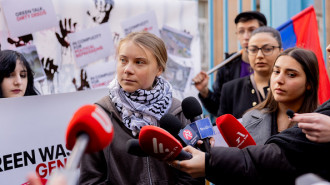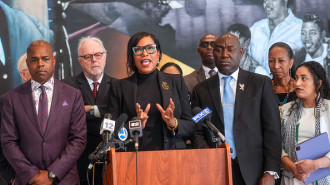Thousands of children referred to UK counter-extremism programme
The Prevent programme aims to stop people being drawn into terrorism.
There were 7,631 referrals in the 2015-16 financial year, a quarter of which were of under-15s, but only 381 required specialist "de-radicalisation training".
The majority of referrals were flagged to Prevent because of concerns over potential Islamist views but the number attracted to the extreme far-right is growing, the report said.
This is the first time the government has published detailed figures on the initiative, which critics have said allows mistrust of British Muslim communities "to spread and to fester".
Labour's Naz Shah, who sits on the Commons Home Affairs committee, said the fact the majority of Islamic extremism referrals required no further action reinforced her concerns with the scheme.
She told the BBC: "If you've referred a child, a young person, and there turns out to be actually nothing that they're doing that's wrong - that's really worrying for me and it's very alarming."
However, Chief Constable Simon Cole, the national policing lead for Prevent, said the number of referrals showed that "trust and support is growing" for the programme, while Security Minister Ben Wallce said it produced "real results".In one case revealed by the Home Office, teachers reported a boy from West London who declared his support for the Islamic State group after watching violent propaganda videos online.
A senior Home Office official said the boy "stood up in class and said he supported IS", adding: "He had watched IS execution videos after searching for news coverage of the Paris attacks.
"It led to him to ones showing brutal executions and burning people."
After a year of support, including mentoring and counselling through the Government's anti-radicalisation programme, case workers say he has "turned his life around".
Greater awareness
The figures reveal that 2,127 of those referred to the scheme in 2015-16 were under 15, including more than 500 girls.
Another 2,147 people reported were aged between 15 and 20 - meaning more than half of the 7,631 people referred in the 12 months to March 2016 were aged 20 or under.
The figures suggest there has been an increase in cases involving under-15s, but officials believe this could be due to a greater awareness among teachers of the potential warning signs.
Prevent has previously been heavily condemned when it introduced "anti-radicalisation procedures" in schools to monitor children that could be "at risk", as fear grew over young British Muslim students leaving Britain to join IS militants in Syria.
The policy was introduced after the 9/11 attacks in New York, as part of a broader British government strategy to tackle radicalisation.
In 2010, the programme received a major setback when it was revealed that 72 cameras were secretly placed in Muslim-concentrated areas of Birmingham to monitor the community.
![London police [Getty] London police [Getty]](/sites/default/files/styles/large_16_9/public/media/images/3C159F55-1A5A-47B2-B7C4-77E014AA944E.jpg?h=d1cb525d&itok=4WsYf6Q-)






 Follow the Middle East's top stories in English at The New Arab on Google News
Follow the Middle East's top stories in English at The New Arab on Google News


